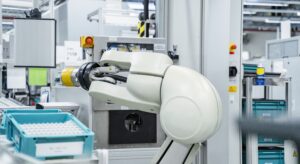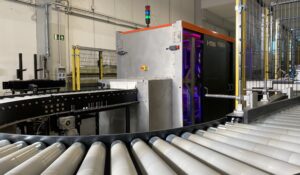Robotics has arrived to transform multiple industrial sectors, and the food industry is no exception. With the increasing demand for food products and the need to ensure high quality standards, automation through robotics has proven to be a crucial tool to improve production processes.
In this article we explore how robots are optimizing production and ensuring quality in the food industry.
Robotics in food production: efficiency and precision at every stage
The food industry faces constant challenges, such as increasing demand, pressure to reduce costs and the need to comply with strict food safety regulations. This is where robotics plays a key role, offering solutions that improve process efficiency and ensure end-product quality.
Industrial robots can perform a variety of repetitive tasks that were previously performed manually, such as packaging, labeling, cutting and sorting food. By automating these processes, production speed is increased, human error is minimized and greater consistency in product quality is ensured.
One of the most representative examples of robotics in the food industry is the use of robots for packaging. These robots can handle products delicately and precisely, ensuring that each piece is packaged correctly without damaging the food. In addition, robots are able to work long shifts without losing their performance capacity, which increases productivity on production lines.
Improving food safety and quality control
Food safety is a priority in the industry, as any error in the process can put consumers’ health at risk and damage brand reputation. Robots, combined with advanced technologies such as machine vision and sensors, are helping to improve quality control at every stage of production.
Machine vision, for example, is used in robotic systems to inspect the quality of food products automatically. These systems can detect imperfections in food, such as stains, damage or deformations, with much greater accuracy than a human being could achieve. This not only improves product quality, but also reduces waste, as defective products are efficiently identified and discarded.
In addition, robots can be equipped with sensors for temperature, humidity and other parameters critical to food safety, allowing the storage and transport conditions of the products to be monitored. In the case of perishable products, this technology is essential to ensure that food is kept in optimal conditions, reducing the risk of contamination or spoilage.
Collaborative robots and sustainability in the food industry
Another significant advance in robotics within the food industry is the use of collaborative robots or cobots. Unlike traditional industrial robots, cobots are designed to work safely alongside human operators without the need for safety barriers. This collaboration allows employees to focus on more specialized tasks, while the cobots handle repetitive, high-volume tasks such as packaging or stacking products.
The integration of cobots also improves the flexibility of production lines. Instead of relying on fixed automated systems that require complex reconfiguration, cobots can adapt to different products and perform various functions without extensive reprogramming. This is particularly beneficial in industries such as food production, where production lines must be frequently adjusted to handle different types of products and packaging.
On the other hand, robotics also plays an important role in the sustainability of the food industry. By automating processes, waste generated during production is reduced, contributing to greater efficiency in the use of resources. Robots can also optimize energy use, ensuring that only the necessary resources are used at each stage of the process, reducing environmental impact.
The future of robotics in the food industry
Robotics has proven to be a catalyst for improving both production process efficiency and quality in the food industry. Automation not only reduces operating costs, but also ensures that products meet the safety and quality standards that consumers expect. As technology continues to advance, robotics is likely to play an even more central role in the industry, from production to distribution to quality control.
The future of the food industry is intrinsically linked to the development of smarter and more versatile robotic technologies. Over time, we will see more innovations that not only optimize production, but also promote sustainability and food safety throughout the process. Robotics is undoubtedly here to stay and transform the food industry in a more efficient, accurate and sustainable way.
In the engineering department of i-mas we are specialized in the combination of artificial vision technologies, deep learning and industrial automation in production processes, which allows us to offer integral solutions adapted to the specific needs of each client.
Want to learn more about our services? Contact us or visit our projects section!



